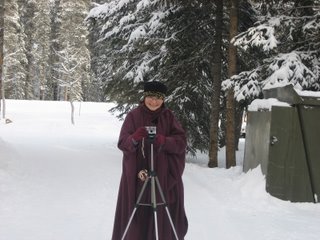
Digital cameras let you review and delete photos immediately, meaning that you can catch unique moments and save money on processing. Cameras that use film require a waiting time to see the results, and often your subject (or vacation) is long gone before you see if you need to retake any shots. We all have drawers or cardboard boxes in storage of envelopes full of photo prints that we paid for but which didn't turn out.
I've just finished giving three workshops in using digital cameras to seniors who are in recovery from strokes. This was part of the "Lines of Life" project, offered by the City of Vancouver. I found people eager to learn, but anxious about how complex and delicate the entry-level cameras would be. Confidence rose after we repeated "camera calisthenics"(turning it on, taking shots, reviewing, and deleting)as a warmup every session. It was very exciting to see how much people enjoyed themselves. Our primary goal was to give people a useful skill, but we also got some interesting photos and text.
One thing I learned for myself was that I wanted some of those features I was teaching on my own camera! I especially wanted to be able to take video. I am impressed at how people can now afford to be carrying around the tool to record the stories of their daily lives (or even news events they happen to witness). I took my new camera to a two-day 50th birthday party and, using the software that came with the camera, edited the small movie clips and still photos together into a 3 1/2 minute piece called "Sisters" which has a storyline about the interconnectedness of women. The first night, Sarah read us a story that inspired her, so I took portraits of her with each friend, and had them read a bit of the story as a voiceover. Many digital cameras record digital audio now, as part of their video function. Many have the option of recording a "sound memo" for verbal notes about still images.

I'm an art student and have access to lots of great equipment, but only until I graduate. It is a relief to me to know that I can still put my content and stories out there with consumer-level tools. Also, increasingly my interest is in assisting people to take control of their own image-making -- so I'm all excited about showing how you can produce your own videos without having to be able to afford video cameras and editing equipment.